Governing bodies play a vital role in regulating sponsorship practices by setting guidelines that promote transparency, fairness, and compliance in advertising and promotional activities. These standards not only protect consumers but also foster ethical behavior and trust among sponsors, recipients, and the public, ensuring the integrity of various sectors, including sports.
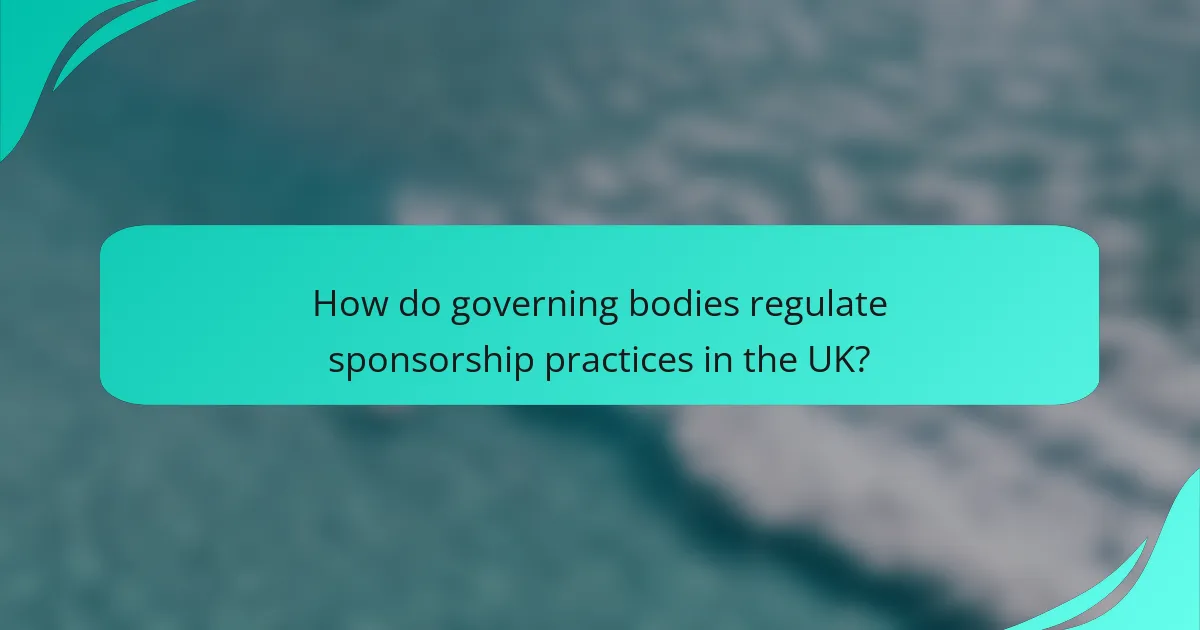
How do governing bodies regulate sponsorship practices in the UK?
Governing bodies in the UK regulate sponsorship practices by establishing guidelines and standards that ensure transparency, fairness, and compliance within advertising and promotional activities. These regulations help protect consumers and maintain ethical standards in sponsorship agreements across various sectors.
UK Advertising Standards Authority (ASA) guidelines
The UK Advertising Standards Authority (ASA) sets clear guidelines for sponsorship practices, focusing on truthfulness and transparency in advertising. Sponsors must ensure that their promotions do not mislead consumers about the nature of the sponsorship or the products being endorsed.
For example, if a celebrity endorses a product, the sponsorship must be clearly disclosed to avoid any ambiguity. The ASA encourages the use of clear labeling, such as “advertisement” or “sponsored,” to inform consumers about the nature of the content.
Ofcom’s role in sponsorship regulation
Ofcom, the UK’s communications regulator, oversees sponsorship in broadcasting, ensuring that sponsorship arrangements comply with established rules. This includes monitoring the content of sponsored programs to ensure that they do not compromise editorial independence.
Ofcom requires that sponsorship is clearly identified and that it does not influence the content of the programming. For instance, if a program is sponsored by a brand, viewers should be made aware of this sponsorship before the program begins.
Impact of UK Code of Non-broadcast Advertising
The UK Code of Non-broadcast Advertising governs sponsorship practices outside of traditional broadcasting, covering areas such as print and online media. This code ensures that sponsorships are presented honestly and do not exploit vulnerable audiences.
Under this code, sponsors must avoid using misleading claims or failing to disclose sponsorship relationships. For instance, if a social media influencer is paid to promote a product, they must clearly indicate this relationship to their audience, typically using hashtags like #ad or #sponsored.
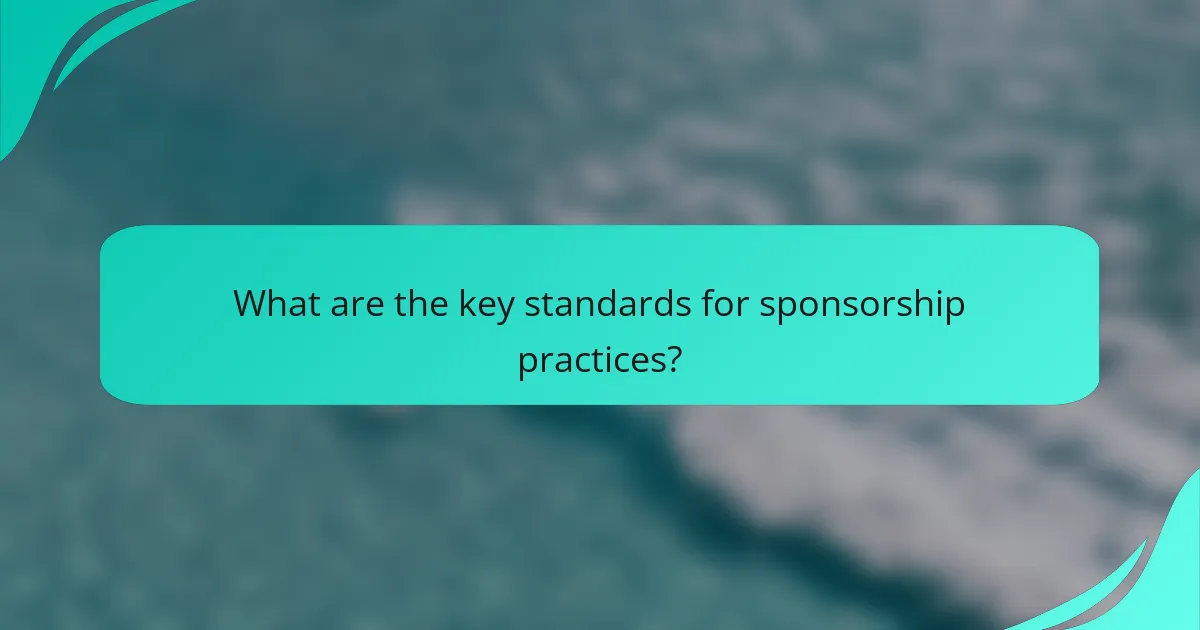
What are the key standards for sponsorship practices?
Key standards for sponsorship practices focus on ensuring transparency, ethical behavior, and compliance with legal regulations. These standards help maintain trust between sponsors, recipients, and the public while promoting fair competition.
Transparency and disclosure requirements
Transparency in sponsorship practices involves clear communication about the nature and terms of sponsorship agreements. Sponsors must disclose their financial contributions and any potential conflicts of interest to the public and relevant stakeholders.
For instance, organizations may be required to publish sponsorship details in annual reports or on their websites. This practice fosters accountability and allows consumers to make informed decisions about the brands they support.
Ethical considerations in sponsorship
Ethical considerations in sponsorship include ensuring that partnerships align with the values of both the sponsor and the recipient. Sponsors should avoid relationships that could be perceived as exploitative or misleading, particularly in sensitive areas like health or education.
Additionally, organizations should assess the potential impact of sponsorship on their reputation. For example, partnering with a controversial brand may lead to public backlash, so careful evaluation is essential.
Compliance with competition laws
Compliance with competition laws is crucial in sponsorship practices to prevent anti-competitive behavior. Sponsorship agreements must not restrict market access or create unfair advantages for certain brands over others.
Organizations should familiarize themselves with local regulations, such as the European Union’s competition laws or the Federal Trade Commission guidelines in the United States. Regular legal reviews of sponsorship contracts can help ensure adherence to these laws and avoid potential penalties.
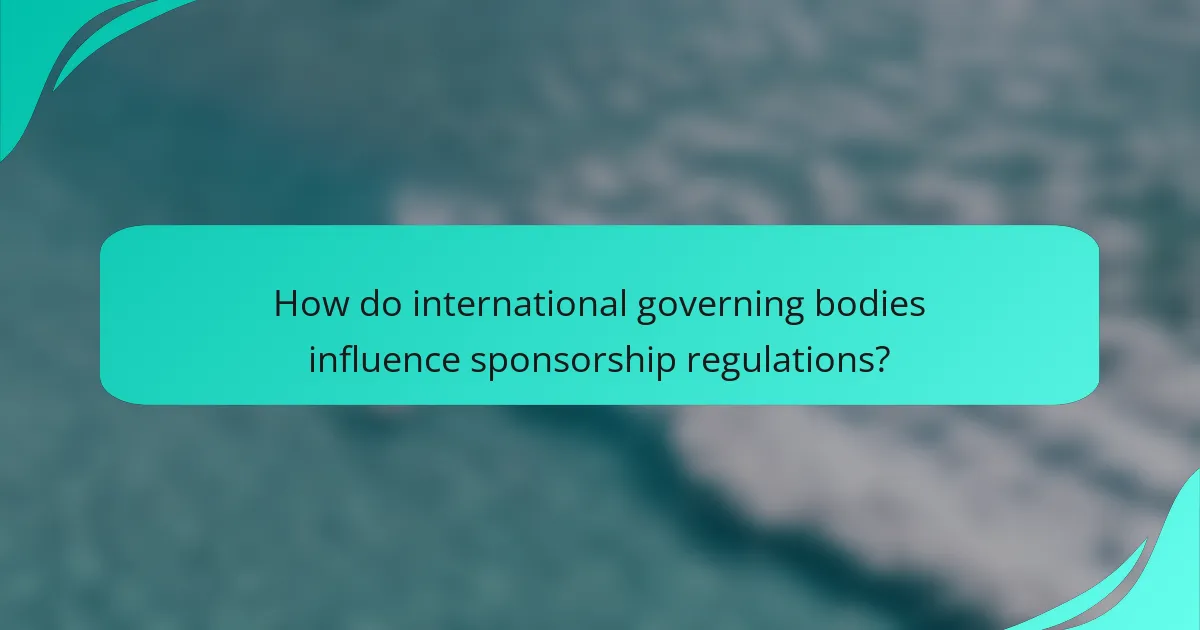
How do international governing bodies influence sponsorship regulations?
International governing bodies play a crucial role in shaping sponsorship regulations by establishing guidelines that ensure fairness, transparency, and ethical practices in sports. These regulations help maintain the integrity of competitions and protect the interests of athletes, sponsors, and fans alike.
FIFA’s sponsorship guidelines
FIFA has established comprehensive sponsorship guidelines that govern the relationships between sponsors and football organizations. These guidelines outline the types of sponsorships permitted, the branding visibility allowed, and the ethical standards that must be adhered to during events.
For example, FIFA prohibits sponsorships from companies involved in gambling or alcohol in certain regions, reflecting its commitment to promoting responsible practices. Sponsors must also ensure that their marketing strategies align with FIFA’s values and do not exploit the sport’s image.
International Olympic Committee (IOC) sponsorship standards
The IOC sets strict sponsorship standards to protect the Olympic brand and ensure that sponsors contribute positively to the Games. These standards include criteria for sponsor selection, advertising practices, and compliance with global regulations.
For instance, the IOC limits the number of official sponsors per Olympic cycle to maintain exclusivity and maximize the value for each partner. Additionally, sponsors are required to support the Olympic Movement’s values, including respect, excellence, and friendship.
World Anti-Doping Agency (WADA) regulations
WADA regulations impact sponsorship practices by enforcing strict anti-doping policies that sponsors must follow. These regulations aim to ensure a level playing field in sports and protect athletes’ rights and health.
Sponsors are often required to promote clean sport initiatives and may face repercussions if they are found to support athletes or organizations involved in doping violations. This creates a responsibility for sponsors to align their branding with ethical practices and support anti-doping efforts actively.
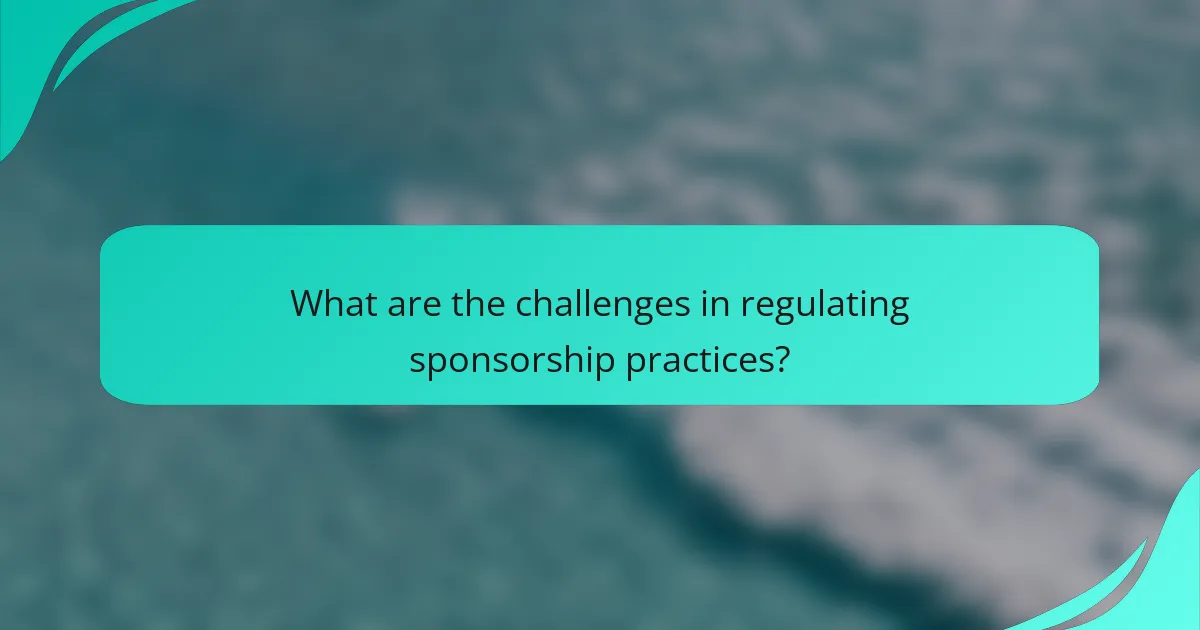
What are the challenges in regulating sponsorship practices?
Regulating sponsorship practices presents several challenges, including ensuring compliance, adapting to new digital trends, and managing inconsistencies across different jurisdictions. These factors complicate the enforcement of standards and the effectiveness of regulations.
Enforcement of regulations
Enforcement of sponsorship regulations can be difficult due to varying levels of oversight and resources among governing bodies. Organizations may struggle to monitor compliance effectively, especially when sponsorships span multiple regions or platforms. Regular audits and clear reporting requirements can help improve adherence to established standards.
To enhance enforcement, regulators should consider implementing a tiered approach, where larger sponsors face stricter scrutiny compared to smaller entities. This can help allocate resources efficiently while maintaining a fair playing field.
Adapting to digital sponsorship trends
The rise of digital platforms has transformed sponsorship practices, creating new challenges for regulation. Influencer marketing and online sponsorships often lack clear guidelines, making it difficult for governing bodies to enforce existing standards. Regulators must stay informed about emerging trends to develop relevant policies.
To address these challenges, organizations should establish clear guidelines for digital sponsorships, including transparency in disclosures and compliance with advertising standards. Training for sponsors and influencers on these regulations can also foster better practices.
Global inconsistencies in regulations
Global inconsistencies in sponsorship regulations can create confusion for companies operating in multiple countries. Different jurisdictions may have varying definitions of sponsorship, disclosure requirements, and penalties for non-compliance. This can lead to unintentional violations and reputational damage.
To navigate these inconsistencies, businesses should conduct thorough research on the regulations in each market they operate in. Collaborating with local experts or legal advisors can help ensure compliance and mitigate risks associated with cross-border sponsorship activities.

What frameworks exist for evaluating sponsorship compliance?
Various frameworks help organizations evaluate sponsorship compliance, focusing on adherence to legal standards, ethical guidelines, and industry best practices. These frameworks often include internal audits, third-party evaluations, and adherence to specific regulations that govern sponsorship activities.
Best practices for sponsorship audits
Conducting effective sponsorship audits involves systematic reviews of agreements, financial transactions, and promotional activities. Key practices include establishing clear objectives for the audit, maintaining thorough documentation, and engaging independent auditors to ensure objectivity.
Regular audits should be scheduled, ideally annually or semi-annually, to assess compliance with both internal policies and external regulations. Utilizing checklists can streamline the process, ensuring that all critical aspects are covered, such as contract terms, deliverables, and financial reporting.
Criteria for assessing sponsorship agreements
When assessing sponsorship agreements, consider factors such as alignment with brand values, target audience reach, and the potential for measurable outcomes. Agreements should clearly outline the roles and responsibilities of each party, including deliverables and timelines.
Additionally, evaluate the financial terms, ensuring they are fair and transparent. Common criteria include the total investment required, expected return on investment (ROI), and any performance metrics that will be used to gauge success. Avoid vague terms that could lead to misunderstandings or disputes later on.

What emerging trends are shaping sponsorship regulations?
Emerging trends in sponsorship regulations are primarily influenced by social media dynamics, sustainability initiatives, and technological advancements. These factors are reshaping how sponsorships are structured, monitored, and perceived by the public and regulatory bodies.
Influence of social media on sponsorship
Social media has transformed sponsorship practices by enhancing visibility and engagement. Brands now leverage platforms like Instagram and TikTok to connect with audiences, making transparency crucial in sponsorship disclosures.
Regulatory bodies are increasingly focusing on ensuring that sponsored content is clearly labeled to avoid misleading consumers. This means sponsors must adhere to guidelines that require clear identification of paid partnerships, often using hashtags like #ad or #sponsored.
Increased focus on sustainability in sponsorship
There is a growing emphasis on sustainability within sponsorship agreements, driven by consumer demand for environmentally responsible practices. Brands are now expected to align their sponsorships with sustainable initiatives, promoting eco-friendly events and partnerships.
Regulatory frameworks are evolving to encourage or mandate sustainability disclosures in sponsorship deals. This may include reporting on the environmental impact of sponsored events or the sustainability practices of partners involved.
Technological advancements in monitoring compliance
Technological innovations are enhancing the ability to monitor compliance with sponsorship regulations. Tools such as automated tracking systems and AI-driven analytics are being utilized to ensure adherence to disclosure requirements and ethical standards.
Organizations can implement these technologies to streamline compliance processes, reducing the risk of violations. Regular audits and real-time monitoring can help sponsors maintain transparency and build trust with their audiences.
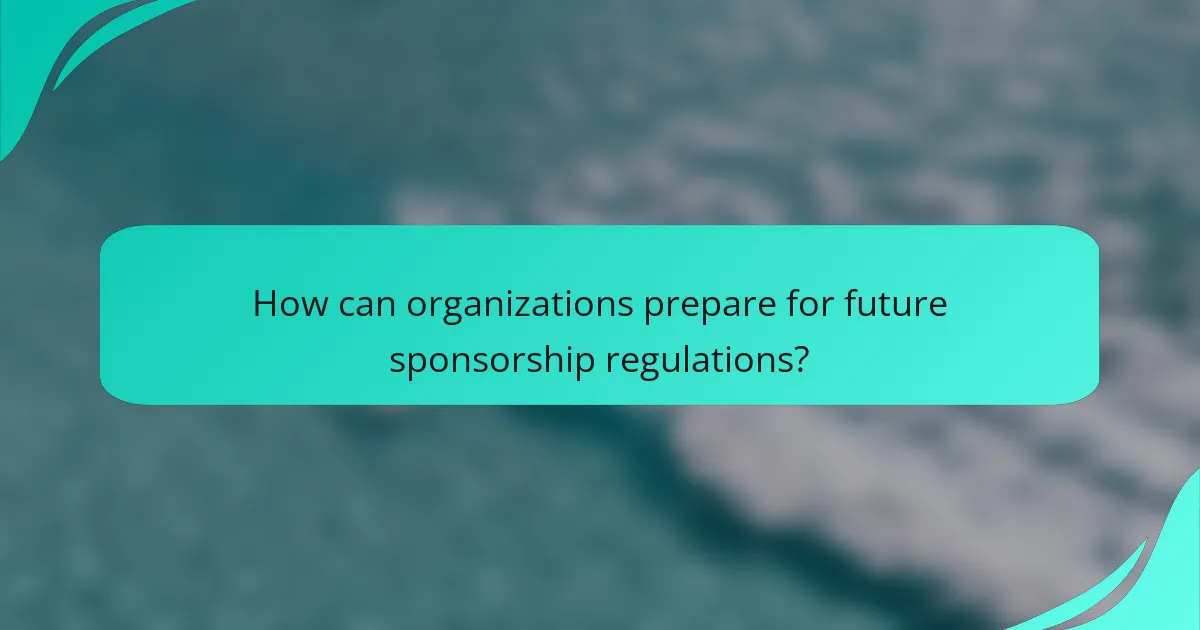
How can organizations prepare for future sponsorship regulations?
Organizations can prepare for future sponsorship regulations by staying informed about industry standards and actively engaging with governing bodies. This proactive approach helps ensure compliance and fosters positive relationships with stakeholders.
Understanding current regulations
To effectively prepare for future sponsorship regulations, organizations must first understand the current legal framework governing sponsorship practices. This includes familiarizing themselves with relevant laws, guidelines, and ethical standards that apply to their industry.
Regularly reviewing updates from regulatory bodies and industry associations can help organizations stay ahead of changes. For instance, organizations in the European Union should monitor the General Data Protection Regulation (GDPR) and its implications for sponsorship agreements.
Developing internal policies
Creating robust internal policies is essential for compliance with sponsorship regulations. Organizations should establish clear guidelines that outline acceptable sponsorship practices, including disclosure requirements and ethical considerations.
These policies should be communicated effectively to all employees involved in sponsorship activities. Regular training sessions can reinforce understanding and adherence to these guidelines, minimizing the risk of violations.
Engaging with stakeholders
Engaging with stakeholders, including sponsors, partners, and regulatory bodies, is crucial for staying informed about potential changes in sponsorship regulations. Open communication can help organizations understand the expectations and concerns of various parties.
Participating in industry forums and discussions can provide valuable insights into emerging trends and regulatory shifts. Organizations should also consider forming alliances with other entities to advocate for fair and transparent sponsorship practices.
